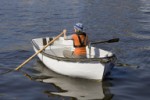Rowing or Sailing?
(A Metaphor for Christian Formation)
 For many Christians, the spiritual life is a lot like rowing a boat. Although it may become wearisome at times, they do their best to persist and remain as consistent as possible, often in the face of considerable difficulty. Not that they try to do this all on their own. Having attended many seminars on the value of rowing as opposed to slacking, they keep up their energy by attending weekly meetings and praying for the Holy Spirit to give them the strength and endurance to row well.
For many Christians, the spiritual life is a lot like rowing a boat. Although it may become wearisome at times, they do their best to persist and remain as consistent as possible, often in the face of considerable difficulty. Not that they try to do this all on their own. Having attended many seminars on the value of rowing as opposed to slacking, they keep up their energy by attending weekly meetings and praying for the Holy Spirit to give them the strength and endurance to row well.
 Of course there are setbacks. Some find themselves in an opposing current and no matter how hard they row, the boat just seems to go more backward than forward. Still others could swear they were never issued both oars, and spend much of the time going in circles or switching sides to keep from getting too far off course. Most distressing of all are those who can never row for more than a few minutes at a time before becoming exhausted. No matter how much they pray, they never seem to have enough energy and may privately wonder if the Holy Spirit is holding out on them.
Of course there are setbacks. Some find themselves in an opposing current and no matter how hard they row, the boat just seems to go more backward than forward. Still others could swear they were never issued both oars, and spend much of the time going in circles or switching sides to keep from getting too far off course. Most distressing of all are those who can never row for more than a few minutes at a time before becoming exhausted. No matter how much they pray, they never seem to have enough energy and may privately wonder if the Holy Spirit is holding out on them.
Sometimes those who are stronger and pulling well will call out advice on how to steer or how to hold the oars. The advice usually lands on the strugglers like an anchor, but they take a deep breath and try harder. Every once in a while, someone will yell out a real zinger like: “You have to really want to row, or nothing will ever happen!” and some of the weaker ones will stop rowing altogether. From time to time the leaders just shake their heads and wonder why it is that so much effort is spent making so little progress.
Another Way
 Imagine now a sail, full and bright, pulling each boat with all the power of the wind. The oars are gone, along with sore arms and aching backs. Instead, the boaters are learning to catch the wind and give up the work of movement to something much more powerful than they could ever be. And movement it is! Waves pour off each bow and the wakes they leave behind churn with foamy water. It’s actually fun!
Imagine now a sail, full and bright, pulling each boat with all the power of the wind. The oars are gone, along with sore arms and aching backs. Instead, the boaters are learning to catch the wind and give up the work of movement to something much more powerful than they could ever be. And movement it is! Waves pour off each bow and the wakes they leave behind churn with foamy water. It’s actually fun!
Oh, there are things to do, and lots more to learn. But this is so far removed from rowing that it’s not even possible to compare the two. Even more exciting is the discovery that the wind in the sail is none other than the Holy Spirit himself. Which means that the apprentice sailors are in truth witnessing the power of God and learning to engage with him in tangible ways that they never experienced as rowers. Clearly they need to learn how to participate with the wind. But that is light-years from asking God to give them the strength to do all the work of rowing.
Enter Christian Formation
Christian Formation is every bit as different from traditional models of discipleship as sailing is from rowing. Most of us have experienced the heavy weight of knowing all the things we should be doing and all the things we should not be doing, and the exhaustion of being forever behind where we think we ought to be by now. Giving more and trying harder seem to be the only alternatives to poor performance, despite the desperate prayers for God to provide the power for our efforts. Many of us have virtually given up hope of becoming more of what God wants us to be because we have no idea how to add any more to what we are already doing.
 When we stop and ask what it is that Christians need to do in order to grow, what do we hear? Read your Bible, pray, and get involved in ministry. But Bible reading often feels more like doing homework than feeding the soul, and what many Christians seem to get out of it is an even stronger sense of what we need to do in order to be okay. Prayer is also hard, sometimes because we cannot seem to focus and other times because we cannot figure out how to pray for help. On the one hand we feel the need to ask for forgiveness for what we can’t seem to do right. On the other hand, when we pray for strength we are left perplexed as to why God does not make us strong enough to get it right. Lastly, the prospect of getting more involved in ministry is the very thing we dread, doing more. We keep hearing the same thing over and over: “Row harder!”
When we stop and ask what it is that Christians need to do in order to grow, what do we hear? Read your Bible, pray, and get involved in ministry. But Bible reading often feels more like doing homework than feeding the soul, and what many Christians seem to get out of it is an even stronger sense of what we need to do in order to be okay. Prayer is also hard, sometimes because we cannot seem to focus and other times because we cannot figure out how to pray for help. On the one hand we feel the need to ask for forgiveness for what we can’t seem to do right. On the other hand, when we pray for strength we are left perplexed as to why God does not make us strong enough to get it right. Lastly, the prospect of getting more involved in ministry is the very thing we dread, doing more. We keep hearing the same thing over and over: “Row harder!”
What all of these approaches have in common is the belief that it really is up to us to do what Christians are supposed to do, and that God’s part is to provide the necessary energy to make it happen. We are more or less left with the conclusion that the only difference in “rowing” between the Old Covenant and the New Covenant is that New Testament rowers get injections to help them.
This paradigm is terribly mistaken!
We need to come to grips with the fact that this approach to the Christian life has very little to do with life led by the Spirit. It is essentially life under the Law dressed up in New Testament terminology. No matter how much we try to give the Holy Spirit credit for whatever good happens under this paradigm, this whole way of proceeding is firmly rooted in our own effort, based on our own willpower and our own understanding of what we need to do in order to become better Christians.
Now as it turns out, some of us are really good rowers! Unfortunately, that adds to the illusion that this really is the way to go. But quite literally, this is the way of mastery as it is known in the world, not the way of transformation in the Kingdom of God. All of life outside the Kingdom tells us that advancement is earned, and mastery is achieved through hard work. Even human maturity is based on developmental tasks that must be practiced and learned.
 Not so in the Kingdom of God. Purity, wholeness, healing, and restoration of the ruined soul result directly from engaging with God — not in traditional one-way prayer, but from dynamic tangible interaction in which we are involved both actively and consciously. Instead of trying to make ourselves do more of what we think Christians ought to do, hoping that will make us into the people we were meant to be, we need to be made into who God meant us to be so that we can do what we were meant to do. That’s the difference between rowing and sailing!
Not so in the Kingdom of God. Purity, wholeness, healing, and restoration of the ruined soul result directly from engaging with God — not in traditional one-way prayer, but from dynamic tangible interaction in which we are involved both actively and consciously. Instead of trying to make ourselves do more of what we think Christians ought to do, hoping that will make us into the people we were meant to be, we need to be made into who God meant us to be so that we can do what we were meant to do. That’s the difference between rowing and sailing!
Instead of making myself say the words that my offender is forgiven, what if God changed my heart so that I actually forgave him and my mouth expressed the care of my heart? Instead of trying hard to act as if I love my enemy, what if I engaged with God in ways that changed me so that I actually loved my enemy and my actions came out of that? My task then becomes a matter of lining up with the wind that is in my sail, rather than rowing against the current of my own heart in order to achieve an outcome I think is right.
Most people have given up the belief that such transformation is possible. Feeling helpless in the face of their own mal-formed souls, they resort to forcing the behavior that they believe Christians ought to portray out of obedience to God. But that amounts to picking up the oars because we never learned to sail.
Well, what if we could learn? What if I came to believe that God not only can change my heart, he very much wants to do so? What if the biggest thing by far between my heart and my transformation is my own misinformation and poor training on how to engage with God in ways that bring life? What if I can learn how to sail? Now that would be Good News!
Learning to be with God, develop a genuine relationship with God, and to engage with God for transformation is precisely what Christian Formation is about – how to be formed more and more into the image of Christ, so that the life of Christ comes out of us by virtue of who we are – how to change from the inside out so that good that comes out of us because of who we are and not in an effort to override who we are.
Formation is about learning how to receive from God those things that we cannot do on our own, namely, change our own heart to be more like his. We learn how to feel the wind, to tack with it, to be changed by it, until we find ourselves moved to places that would never have been possible by rowing alone.
We have a God who moved heaven and earth for our restoration and who is committed to restoring our souls as the first fruits of his new creation. What we need to do is to stop trying to get there by direct effort, and instead become apprentices of life, learning how to be with this God who transforms, and to engage with him for our restoration. Then we will become free to be who he has designed us to be and to do what he wants us to do.
I say, “Let’s go sailing!”
Download Now